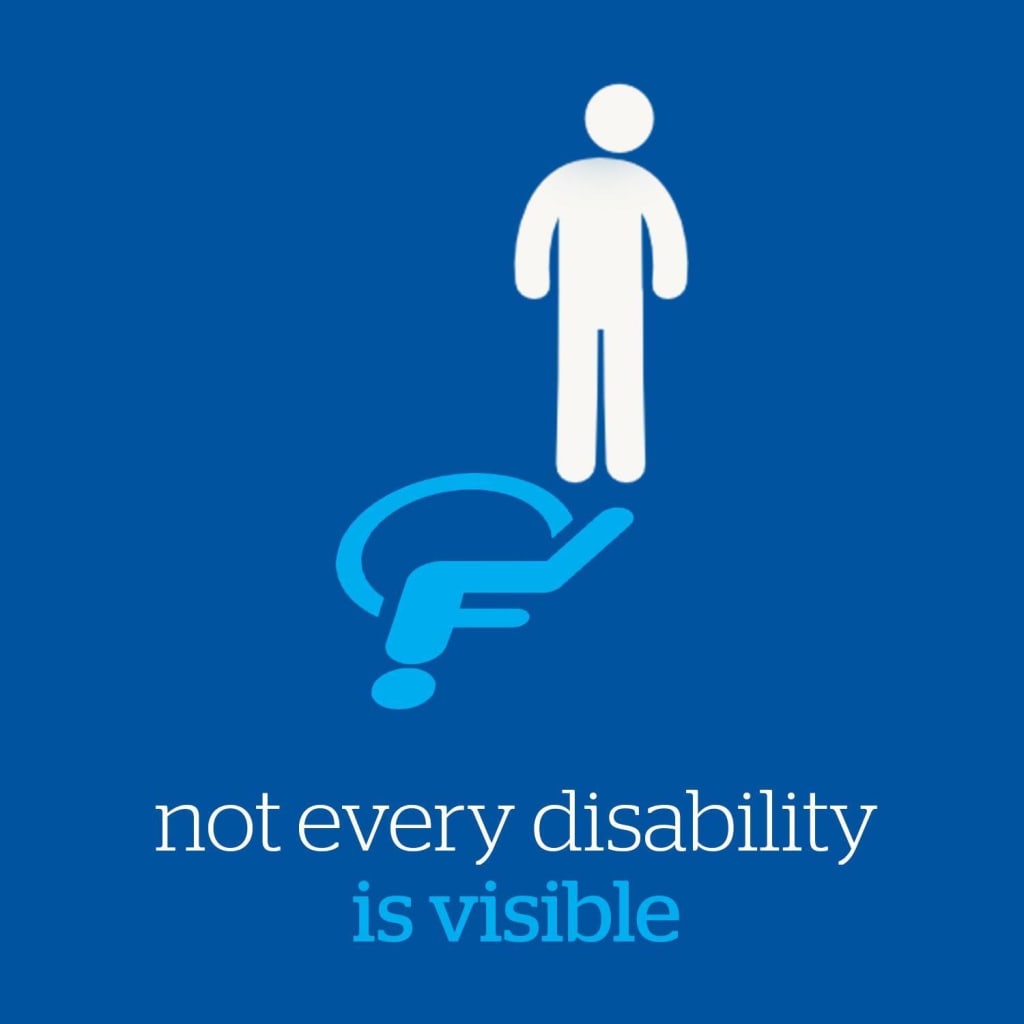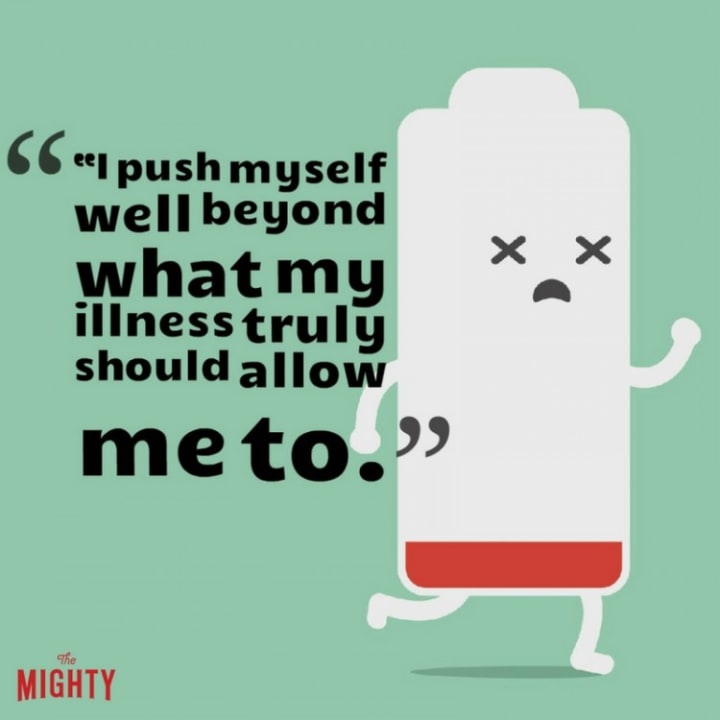Invisible Illnesses
10 Things People Living with an Invisible Illness Want You to Know

96% of people living with chronic conditions have invisible illnesses and chances are you know at least one of them, but do you know exactly what their struggles are? Have you ever wanted to know more about their situation but don't know how to approach them? Here is a list I have compiled of things that many of us living with an invisible illness want you to know.
1. We aren't pretending.

Living with an invisible illness is hard enough without having people constantly doubting us. We already get nasty looks when we park in handicapped spots, or if we use a motorized scooter. When we are in pain, we are not pretending. We don't want to be at home all day. We don't like not being able to work, changing activities, or hobbies due to our illnesses. It makes us feel guilty for taking the time we need to recover because we feel like we are being judged constantly. All we need and want from our support system is to believe us when we say how we feel.
2. Depression is always lurking.

Most of us living with a chronic illness have more than one at a time. All the pressure of managing a chronic illness (not to mention more than one) can create burnout and a feeling of hopelessness. This means depression is always around the corner and some days will be more difficult that others. For some of us depression is also a chemical reaction to our disease (for example, type one diabetes) which can make it more difficult for us to stay on track with our health management. Depression can make us think we are a burden, or that our spouse resents us for not being "useful." If this happens don't try to "cheer us up"; listen to us and our concerns and understand it's not a thing that gets fixed overnight.
3. We need to be checked up on.

When you have an invisible illness it might be easy for people to dismiss you because you "look" fine to them. This doesn't mean we are OK. Checking in through a call, in person, or a text will mean the world to a person with an invisible illness. Dropping in and bringing soup, calling and just listening, not comparing us to anyone else—it doesn't have to be a huge thing just a quick check in. Don't say "you can call me anytime" and then truly not be there for us when we do call. We need to know that we matter to people without having to bring up our issues ourselves.
4. We don't "look" how we feel.

Going back to how we "look," because this is a BIG one for us with invisible illnesses: We call them "invisible" because when people see us they don't see a physical impairment which then lets them assume we are perfectly healthy. Unfortunately, this is not the case. My last job before my doctor put me off work, they did a peer review and they gave me a 2/10 for my appearance. They used the word "disheveled"; they just assumed that I didn't do my hair or makeup because I was lazy when in fact I was battling one of the worse flares of that month and I had several low blood sugars that caused me to get two hours of sleep per night. I'm sure they meant no harm by the comment, but it REALLY hurt me because here I was, in chronic pain and barely holding it together, still trying to go to work, and they judged me based on my looks. Don't judge us, talk to us.
5. We might not follow through on our plans.

When you live with an invisible unpredictable disease you might not be able to follow through on your plans. If you have chronic pain, sometimes a flare can come out of nowhere and you need to stay at home and relax. Sometimes the weather dictates how our bodies react and we might not be able to go out due to those conditions. When this happens, please do not be upset with us; this is not by choice. Please let us raincheck or if possible come to us a different day. We don't like to make anyone upset or think that we don't care about them. Letting us know that you understand brings down the anxiety and guilt we feel.
6. Stress is our number one enemy.

Stress is not good for anybody, but it's definitely not good for people with invisible illnesses. If you have an autoimmune disease (type one diabetes, lupus, hashimotos, etc.) your body is attacking itself and it leaves your defenses weak so much so that stress can bring make your symptoms much much worse. For me, stress makes my blood sugar skyrocket. It makes me flare up in MORE pain that usual, and it gives my depression an excuse to come in full force. If you can help us out and take the stress off in any way, please do. We will appreciate you for it.
7. We are emotionally exhausted.

Having to deal with countless doctor appointments, meds, dietary changes, finger pricks, human pricks, (get it? haha) and medical expenses culminates into total and complete emotional exhaustion. This leaves us a little sensitive and moody at times because we feel like we are managing so much and have no time for other things that in comparison seem not as important. We can get snappy because we are frustrated, but we need our loved ones to let us vent and have a little more patience with us since we have so much we are dealing with.
8. We need emotional validation.

This one is a big one, at least it is for me. As a person with several invisible illnesses there are days I feel annoyed and angry. I feel upset that I have to deal with this forever and all I want from my support system is to feel validated. Trust us, we know it could be worse but we don't want to hear it constantly. We need to know that what we feel is valid and we have the right to be upset, sad, angry as long as we get up and continue the good fight. So if you hear us complaining, don't tell us how we could be worse off and just let our feelings be valid.
9. We know what works for us.

It's inevitable to want to help when you care about someone, and the number one thing that you want to do is share that "remedy" you saw online that will cure their disease, right? Well, don't. When you have a chronic illness you usually have more than one doctor on your medical team who has given you a regimen to follow that includes meds, nutrition, etc. We know that you don't mean any harm with your advice, but trust us, it will not work and it makes us think you question our validity. I have personally been given so many "remedies" to get rid of my type one diabetes and my fibromyalgia that at this point I just laugh it off. If you want to know more about how to help your loved one with an invisible disease, ask them!
10. We need patience and understanding.

As you can see by now, having an invisible desease is not for the faint of heart. We need people around us who can be our support system and can keep us going when we want to throw in the towel. In order for you to do this, you need to have patience and be understanding to the fact that we are dealing with a lot and we might not be in the best mood everyday. We appreciate and love our support systems!
About the Creator
Leslie Montaño
26. Engaged. Pet Mom. Actress. Writer. Creator. Living with Type One diabetes, Celiac Disease, Fibromyalgia and Pernicious Anemia.






Comments
There are no comments for this story
Be the first to respond and start the conversation.